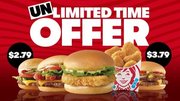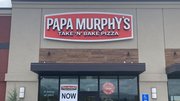Article
Breakfast, beverage competition gets a grip on Dunkin’s sales
The quarter marked Dunkin’ Donuts’ highest afternoon guest count on record, and weekly sales in June reached the highest volume.

July 24, 2014 by Alicia Kelso — Editor, QSRWeb.com
Dunkin’ Brands released its quarterly earnings report this morning, including Dunkin’ Donuts’ U.S. store sales growth of 1.8 percent and 75 net new units in the market.
Although solid, the results still fell a bit shy of expectations and CEO Nigel Travis cited increased competition, particularly in the breakfast and beverage spaces, as a main reason. During the company’s earnings call, Travis said consumers continue to struggle with macroeconomic challenges – driven by stagnant job and GDP growth, the reduction of government programs and increased heating costs – and those challenges are especially affecting the value-focused QSR segment.
"It was a very tough quarter, which is supported by other companies. Lower income households were impacted hardest by the Recession and continues to struggle, which is making the value space highly competitive," he said.
In addition to the fight for value market share, Travis also acknowledged the increasingly crowded breakfast and beverage segments.
"There is no doubt that breakfast is the most competitive daypart and everyone wants to be in the beverage business," he said. "While new entrances don’t necessarily have a direct impact, they increase the overall competitive intensity from existing players."
Discounting effects
A more crowded marketplace typically leads to more discounting, which affected Dunkin’s comps during the quarter.
"I think the discounting effectively impacted outcomes, because it affected the actual yield per transaction," Travis said.
However, transactions themselves were up because of discounting, which in turn grew the brands’ loyalty and share.
Positive menu news
Dunkin’ Donuts U.S. positive comps were driven by new product platforms and LTOs. The brand gained momentum in its afternoon business from these launches, as well, particularly grilled and breaded chicken lines, and a new Angus steak platform.
Coffee break offers by franchisees also drove afternoon sales. Travis said the quarter marked Dunkin’ Donuts’ highest afternoon guest count on record, and weekly sales in June reached the highest volume on record.
Additionally, Dunkin’ has leveraged its barbell menu, featuring both indulgent and DD Smart product. John Costello, president of Global Marketing and Innovation, said this "Choice Strategy," as it’s called internally, has yielded two of the brand’s most successful products – the big and toasted and the turkey sausage breakfast sandwich.
"Interestingly, we continue to see growth on both sides," he said. "Our strategy is to offer choice on both DD Smart and indulgent and I think it’s telling that our top two selling strategies, our breakfast sandwiches, are big and toasted on one side and the turkey sausage on the other. And you will continue to see growth in both big hardy products as well as growth in DD Smart products."
As has been a recent theme with Dunkin’ Donuts in recent years, the product pipeline is robust for future launches. Travis said the rate of testing during Q2 was the strongest it’s been since he joined the company (in January 2009).
Technology news
Another major focus for Dunkin’ has been its loyalty program – DD Perks – and its mobile app. The brand has nearly 8 million downloads of the app and more than 1.3 million rewards members. The company is waiting for the loyalty program to be in place for a full year before divulging too much information.
"We are convinced that Perks will be a significant driver of growth in the future," Travis said. The goal is to reach 2.5 million members by the end of the year.
Also, Travis said stores that have installed digital menu boards are experiencing comp growth. That number of stores has surpassed 2,000.
Unit pipeline
The company’s growth plan also remains robust, with particularly enthusiasm in the new markets of Texas and California.
"The demand for our stores is huge. Holding franchisees back is one of the things we’ve tackled. It’s significant. We have people fighting over territory," CFO Paul Carbone said.
The plan for the remainder of the year calls for:
- Between 380 and 410 net new Dunkin' Donuts U.S. restaurants;
- Between 5 and 10 net new Baskin-Robbins U.S. units;
- Between 300 and 400 net new restaurants internationally across both brands.
 ChatGPT
ChatGPT Grok
Grok Perplexity
Perplexity Claude
Claude








